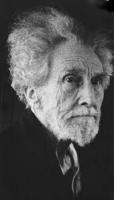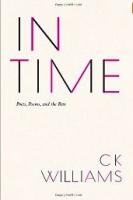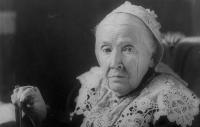October 30, 2012
Edited by David Sanders
Specimen Days
October 30, 2012
1602 –Jean-Jacques Boissard, French poet (b. 1528)
, dies.
1785 – Gustaf P. Creutz, Swedish diplomat/poet (Daphne), dies at 54
.
1842 – Allan Cunningham, Scottish poet and author (b. 1784), dies.
1881 – Elizabeth Madox Roberts, American poet and author (d. 1941), is born.
1885 – Ezra Loomis Pound, Hailey Idaho, poet (Cantos), (d. 1972), is born.
1896 – Kostas Karyotakis, Greek poet (d. 1928)
, is born.
1898 – Yakov Petrovich Polonsky Russian poet (Stichotvorenija), dies at 78.
1910 – Miguel Hernadez Gilabert, Spain, poet (Viento del Pueblo), is born.

And the days are not full enough
And the nights are not full enough
And life slips by like a field mouse
Not shaking the grass
—Ezra Pound, 1885–1972
Poetry In The News
Poets Gather in Exile, in Queens
On a miserable rainy night on the outskirts of Jackson Heights, Queens, a couple of dozen people were gathered for an informal cultural experiment: How do you create a literary community in a place that does not even have a decent English-language bookstore? . . . Yet here they were, on the first Tuesday of a new month, at the monthly gathering of the Jackson Heights Poetry Festival. Read more at the New York Times.
Poetry to Grace Walls of New Hospital
Kaiser Permanente Westside Medical Center is creating a bit of buzz in local literary circles. The buzz surrounds artwork created for the medical center, targeted to open in August 2013. Some of Oregon’s most acclaimed living poets created poetry especially for the hospital. Their work will overlay 9-foot-by-9-foot panels printed with nature images. The poetry and images will let viewers’ imaginations transport them, even if just for a moment or two. The artwork will hang next to the hospital’s main elevators, a natural stopping point that affords the minute or so needed to take in the poetry. Read more at The Lunde Report.
Mystery of Dead Poet’s “Suicide Note” Solved, Police Say
Madison police were on the trail of a potential suicide victim Thursday afternoon, but the trail ended in the words of a 19th century poet. The mystery started out at about 12:20 p.m. Thursday when an east side resident called police after seeing a woman running into Morrison Park in the 1500 block of Morrison Street. Read more at the Cap Times.
Liveright Gets Excited About Poetry for 2013
While Norton’s relaunched Liveright imprint under Bob Weil is mostly focused on nonfiction and edgy mainstream fiction, the imprint’s director of publicity Peter Miller is working to build excitement around poetry for the upcoming season. In June 2013, the relaunched Liveright will publish its first debut poet: Columbia MFA graduate Adam Fitzgerald, whose first book is called The Late Parade, a collection of 48 poems which Boston Review has said perform a “fire dance around meaning itself.” Read more at Publishers Weekly.
World Poetry
View from Okri’s Mountain

As the Indian state of West Bengal celebrates the nine-day Durga puja festival, people there are mourning the death of Sunil Gangopadhyay, one of the state’s greatest literary figures. Though Gangopadhyay wrote exclusively in Bengali throughout his literary life, spanning more than 60 years, he was well-known and admired in the rest of India. Indeed at the time of his death, he was the chief of Sahitya Akademi – or the National Literature Academy of India. Read more at the BBC.
New Books
Time of Useful Consciousness by Lawrence Ferlinghetti
[Hardcover] New Directions, 96 pp., $22.95
New Directions is proud to announce a riveting and galvanizing new book by Lawrence Ferlinghetti. At ninety-three, he shows more power than most any other poet at work today. Ferlinghetti describes his new book, Time of Useful Consciousness, as “a fragmented recording of the American stream-of-consciousness, always westward streaming; a people’s poetic history in the tradition of William Carlos Williams’ Paterson, Charles Olson’s Maximus, Allen Ginsberg’s Fall of America, and Ed Sanders’ America: a History in Verse.”
The Selvage: Poems by Linda Gregerson

[Hardcover] Houghton Mifflin Harcourt, 112 pp., $23.00
In eloquent poems about Ariadne, Theseus, and Dido, the death of a father, a bombing raid in Lebanon, and in a magnificent series detailing Masaccio’s Brancacci frescoes, The Selvage deftly traces the “line between” the “wonder and woe” of human experience. Keenly attuned to the precariousness of our existence in a fractured world—of “how little the world will spare us”—Gregerson explores the cruelty of human and political violence, such as the recent island massacre in Norway and “the current nightmare” of war and terrorism.
Clangings by Steven Cramer
[Paperback] Sarabande Books, 80 pp., $14.95
Schizophrenia may be characterized by a surfeit of language, a refurbishment of our used up words with musical connections every day speech and sense cannot provide. These riffs are “clangings,” and Cramer imagines them into a poetic narrative that exults in both aural richness and words’ power to evoke an interior landscape whose strangeness is intimate, unsteady, and stirring.
The Poems of Octavio Paz translated by Eliot Weinberger
[Hardcover] New Directions, 592 pp., $39.95
Here at last is the first retrospective collection of Paz’s poetry to span his entire writing career, from the first published poem, at age seventeen, to his magnificent last poem; the whole is assiduously edited and translated by acclaimed essayist Eliot Weinberger — who has been translating Paz for over forty years.
In Time: Poets, Poems, and the Rest by C. K. Williams

[Hardcover] University of Chicago Press, 240 pp., $27.50
Winner of the National Book Award, the Pulitzer Prize for Poetry, and numerous other awards, C. K. Williams is one of the most distinguished poets of his generation. . . . He is also a gifted essayist, and In Time collects his best recent prose along with an illuminating series of interview excerpts in which he discusses a wide range of subjects, from his own work as a poet and translator to the current state of American poetry as a whole.
Recent Reviews
We Almost Disappear by David Bottoms
by William Wright
We Almost Disappear, David Bottoms’s ninth poetry collection, continues the poet’s dedication to the natural world—a world of which his family has always been part, and a world that conjures stunning metaphorical backdrops for the poet’s reflections on memory, love, aging, and death. Aptly titled, We Almost Disappear is Southern and gothic in texture—celebratory of family, identity, and imagination, but just as insistent on the acknowledgment of how death encroaches to take these things away. Read more at the Oxford American.
Daily Devotions

Jack Gilbert’s Collected Poems
by David Orr
It is impossible to picture certain poets buying Cheetos at a Sunoco. Granted, this is true of a particular sort of person in any occupation — it’s hard, for example, to imagine Mitt Romney with iridescent orange dust all over his hands, unless he had accidentally purchased Halloween. But there is a kind of poet for whom involvement in the tackier, saltier elements of everyday life and popular culture seems not only unlikely, but almost inappropriate. Read more at the New York Times.
what is amazing
by Jordan Davis
In her third book in four years, Heather Christle asks the right question and has the sense to leave it rhetorical. What is amazing is indeed what packs the crowds into the stadium, as opposed to what is sincere, or labored, or beautiful. There’s a risk to the boastful edge to the title, though—better come through with some astonishment, or the reader will be left thinking “what indeed.” Fans of her strong collections from Octopus will not be disappointed. Read more at the Constant Critic.
Correspondences
Nikky Finney Interview: Poet Talks Favorite Book, Where She Likes To Read

“Where I Like To Read” is a series of short author interviews and blog posts in which writers share their literary tastes and their favorite places to curl up with a good book. Nikky Finney won the National Book Award in 2011 in the Poetry category for her collection Head Off & Split. Read more at the Huffington Post.
A Q&A with Poet Laureate Sonia Sanchez
by Lauren McEwen
It’s been more than 40 years since Sonia Sanchez, writer, activist, teacher and Philadelphia’s first poet laureate, burst on the arts scene with poetry and prose that celebrated all that was black and beautiful. But she still has the same vibrant energy that made her a household name as one of the pillars of the Black Arts Movement in the early 1970s. These days, Sanchez has been busy in Philadelphia working with the Mural Arts Program and First Person Arts on a “peace mural” entitled “Peace Is a Haiku Song.” Read more at the Washington Post.
Print’s Poetry Still a Draw for the Publisher Felix Dennis

by David Carr
Felix Dennis, the British magazine publisher, took America by storm in the 1990s with Maxim, a bawdy men’s magazine with models whose garments always seemed on the precipice of falling off. . . . He also happens to be a best-selling poet in his native England. Read more at the New York Times.
Broadsides
Lincoln’s Reluctant War: How Abolitionists Leaned on the President

by David Von Drehle
In his inaugural address, Abraham Lincoln made a statement that would only later become controversial: “One section of our country believes slavery is right and ought to be extended, while the other believes it is wrong and ought not to be extended. This is the only substantial dispute.” . . . As if in response, The Atlantic, the voice of New England’s abolitionist intellectuals, devoted the first page of its February 1862 issue to a new poem of five short stanzas by a Boston writer named Julia Ward Howe. Read more at The Atlantic.
Mortify Our Wolves *
by Christian Wiman
There comes a moan to the cancer clinic. There comes a sound so low and unvarying it seems hardly human, more a note the wind might strike off jags of rock and ice in some wasted place too remote for anyone to hear. We hear, and look up as one at the two attendants hurriedly wheeling something so shrunken it seems merely another rumple in the blanket, tubes traveling in and out of its impalpability, its only life this lifeless cry. Read more at The American Scholar.
Poetry Wire: Dorothea Lasky v. Elizabeth Bishop
by David Biespiel
All of a sudden my inbox is filling up with links from friends to two essays related to poetry that have almost everything and nothing in common at once, and whose implications say a lot about how the art of poetry gets re- or de- artified. One is a link to an essay by Dorothea Lasky in The Atlantic about using poetry to teach children how to write persuasive essays. The other is a link to a 1983 New Yorker memoir by Elizabeth Bishop about teaching in the U. S. A. School of Writing under the pseudonym of Mr. Margolies. Read more at The Rumpus.
Drafts & Fragments
Thank You, Thank You
by Donald Hall
April is Poetry Month, the Academy of American Poets tells us. In 2012, there were seven thousand four hundred and twenty-seven poetry readings in April, many on a Thursday. For anyone born in 1928 who pays attention to poetry, the numerousness is astonishing; in April of 1948, there were fifteen readings in the United States, twelve by Robert Frost. So I claim. The figures are imaginary but you get the point. Read more at the New Yorker.
Envoi: Editor’s Notes
Read at Your Own Asterisk *
My note this week regards a small adjustment I’m initiating in the format of the newsletter. From time to time, you will come across an asterisk following the title of a piece somewhere in the newsletter. This indicates that I believe the piece is particularly worthy of your attention. This week, I want to draw your attention to “Mortify Our Wolves”by Christian Wiman, poet, translator, and editor of Poetry magazine. It is a personal essay which touches on the power of poetry, but it is about much more. I encourage you take the extra time to read this moving piece. Enjoy.
—David Sanders